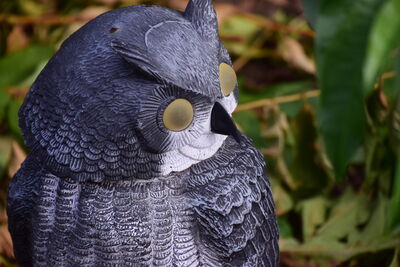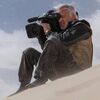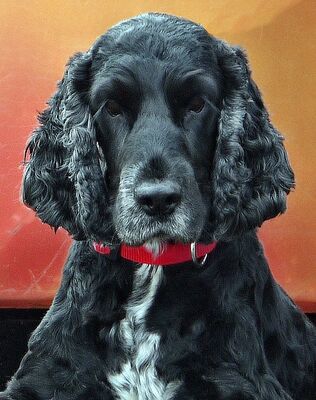Versatility vs Complexity
Jul 10, 2021 15:01:21 #
mikegreenwald wrote:
For many decades, cameras have improved incrementa... (show quote)
I've always found David Busch's guides to be extremely helpful in learning a new camera. Here's one for the R5/R6: https://www.amazon.com/David-Buschs-Digital-Photography-Camera-ebook/dp/B09637XHXW/ref=sr_1_1?dchild=1&keywords=Canon+r5+david+busch&qid=1625943610&sr=8-1
Jul 10, 2021 15:08:10 #
mikegreenwald wrote:
Yes, it helps. I approach most situations in the same way you describe. However one size never fits all, and I appreciate the versatility of the best of modern cameras.
I understand. If you want to master every aspect of your new camera, as I alluded to before, by all means, have at it.
Nowadays, I observe that many photographers become so preoccupied with the technology that they do that at the expense of creativity and spontaionaty,
I noticed that you have assigned many of your camera's features to various tasks and specific areas of photography. As long as you can train yourself to access these features seamlessly and efficiently as you require them, you will be good to go. Certain functions and effects can be applied manually in workaround scenarios.
Personally, I like my camera to be an extension of my hands, heart and mind. Sound too poetic but many of the settings and functions becomes a matter of muscel-memory and reflex, like playing a musical instrument witout looking at the keys. In mastering the mechanics and keeping them simple, I have more time for creativity, expression, light usage and all that good stuff. Takes practice! Weh it comes to computers, I am more of an appliance operator. I don't need to drill down into the circuitry. As long as the software functions, I'm happy. When things go south I call in the techies.
You are right- one size does not fit all and each of us must find our own comfort zone. New gear can be like going on a vacation trip- getting there is half the fun!
Jul 10, 2021 16:13:57 #
mikegreenwald
Loc: Illinois
E.L.. Shapiro wrote:
I understand. If you want to master every aspect ... (show quote)
You are right that expertise takes practice, but I don't for a moment believe that making the camera become an extension of your heart and mind is "too poetic." Visual poetry is what the camera is all about - that's why I'm here, because I learn from others experience, and extend my own by doing so.
I'm not a news photographer, nor do I generally engage in situations where recording for history is my goal. I want to find and develop beauty. Although I have sold photographs here and there on request, and as a favor shot a very few weddings, I regard myself as a very advanced amateur. Nonetheless I have and will always have a great deal to learn, and there are always ways to improve my images either by better use of light or camera or personality in people photography (not just portraits). The same is true for post processing, but my interests don't extend to some of the wild productions we've all seen.
My goal for this topic is to learn how others see our modern tools, and how they approach their use. Someone above said the journey is part of the pleasure - I absolutely agree.
Jul 10, 2021 17:26:25 #
mikegreenwald wrote:
You are right that expertise takes practice, but I... (show quote)
When you become one with your camera, the magic begins.
If you want that magic, then yes, your camera needs to be an extension of yourself. Not in the Nikon Fanboyz sense of selfworth; but rather, in the sense you know every control and how to access and use that control without having to look at the camera. The ergonomic design of Canon EOS models, especially the high-end models like the market-defining EOS R5, are intended to be an extension of your mind and body.
But still, determination and practice are needed. Challenge yourself to have the finger dexterity to access all the relevant controls with the camera held to your eye in a shooting position. Challenge yourself to 'know' the current value of every exposure and AF variable setting in the camera at all times. Challenge yourself to know that three clicks counterclockwise on the aperture dial just opened the aperture by 1-stop in 1/3 increments. If shooting in manual without AUTO-ISO, you need to make the same change to the shutter making it 1-stop slower to keep the same exposure, or 1-stop slower on the ISO. That arithmetic and finger feel should exist in the same way thoughts and words form in your mind, without any thought at all.
Jul 10, 2021 17:36:07 #
I don't need a lot of features on the camera but I never found that they are too complex. I don't need nor want cameras with a lot of functions but I found all the functions are easy to understand. There is nothing complex about cameras.
Jul 10, 2021 17:57:24 #
rook2c4 wrote:
But in Program mode, you still need to dial in the aperture/shutter speed combination.
No need to do so. It’s optional. I’d agree it’s useful. Add toggled AEL to that and you’re really rawkin out !!
Jul 10, 2021 18:17:38 #
rook2c4 wrote:
But in Program mode, you still need to dial in the aperture/shutter speed combination.
Not on my Canon. Option is there, doesn't have to be done.
Jul 11, 2021 05:45:08 #
rmalarz wrote:
Although I'm familiar with all the features my cameras offer, I tend to pay attention to only three, ISO, Shutter speed, and Aperture. The rest is just "chrome plating"
--Bob
--Bob



Jul 11, 2021 06:20:34 #
I always opt for absolute control over every aspect of the photographic process, even if that means long hours of study and research, tutorials or books in order to understand what is possible.
Jul 11, 2021 06:25:47 #
Jul 11, 2021 06:29:15 #
CHG_CANON wrote:
When you become one with your camera, the magic be... (show quote)
Shooting action you don't have time for all this b...it - subjects have moved on while your trying to adjust ISO,shutter speed, aperture etc. You need to be prepared before hand otherwise you're dead in the water.
Jul 11, 2021 06:34:49 #
mikegreenwald wrote:
For many decades, cameras have improved incrementa... (show quote)
The camera you have is an amazing tool. I own the R6 and the focusing system with face and eye recognition alone make these cameras worth the purchase alone. Not to mention the speed of the camera. Don't let the features overwhelm you. Use your quick menu to adjust your settings. Depending on what I'm shooting I use either the shutter or aperture priority mostly. If I want consistent exposure then I'll shoot in manual mode. That's all there is to it. There are also many youtube videos from professionals that go through setting up the configuration of your camera.
John Greengo is an instructor on Creativelive.com and has many classes available. But he's decided to publish his courses on his own website and has just released a course specifically for the R5. His first 3 lessons are free.
He is the best instructor I've ever experienced in my opinion. His approach will put you at ease as he simplifies everything he teaches. Check out the link below. This course is well worth the price. You will not be disappointed.
https://shop.johngreengo.com/collections/all/products/canon-r5-complete-camera-guide?fbclid=IwAR3EU-n79pCyKMjvs92p3HodLz-kugGkcgzN7KSwVQG1K8uzAdurHNFyrGA
Jul 11, 2021 06:36:58 #
No compromise for me. I want the maximum flexibility and features possible, even if it means hours of study and research, tutorials and books in order to understand all the possible options. It may be that I use a feature only once or twice a year, but it is always worth it to me to have the option.
Here is an example. I wanted to do HDRs of the lunar eclipse last month. However, shooting a bracket series with a long telephoto presents some problems with vibration. For this to work I needed to be able to fire off the entire series without ever touching the camera, and to minimize shutter shock as well. My camera has an electronic shutter, so no worries about shutter vibrations, but in addition, I am able to fire off a bracket series with the self-timer, something I never saw on any of my earlier cameras. I also had the option of shooting five shots at 3 EV intervals, which was necessary to make the shot work based on the extreme dynamic range. Here is the result, something I had never been able to achieve before without a few options that I will certainly not use often, but am absolutely delighted that they were included on the camera (Sony A7R4).
Here is an example. I wanted to do HDRs of the lunar eclipse last month. However, shooting a bracket series with a long telephoto presents some problems with vibration. For this to work I needed to be able to fire off the entire series without ever touching the camera, and to minimize shutter shock as well. My camera has an electronic shutter, so no worries about shutter vibrations, but in addition, I am able to fire off a bracket series with the self-timer, something I never saw on any of my earlier cameras. I also had the option of shooting five shots at 3 EV intervals, which was necessary to make the shot work based on the extreme dynamic range. Here is the result, something I had never been able to achieve before without a few options that I will certainly not use often, but am absolutely delighted that they were included on the camera (Sony A7R4).
Jul 11, 2021 06:39:45 #
mikegreenwald, you stated my dilemma well expressed.
I lusted for a Minolta i7000 and its great advances in photography, 1985. Got one, and was disappointed because taking a simple photo required going thru a menu-maze and the photo-moment escaped. Whereas, my other SLR had an arrow meter in the view and I could adjust all parameters with my fingertips quickly as I viewed and made in mind adjustments for speed and lens opening and focus and one captured the photo-moment.
Jump forward to now, my Sony HS-50 Superzoom is in my pocket quick and easy, but my Panasonic TZ100 Superzoom with is the ability to do everything one could dream of... a dream so good it is a nightmare...
My age, 85, but I think it is an issue of the same too-goodness I was confronted with in 1985 ... 35 years go at age 50. Mind you, I am a scientist and use to working with complex scientific instruments. The difference is that the scientific instrument is focused on a particular task. A spectrograph does not have a menu to change it to become a gas chromatograph. It is want it is, and it is not an every thing like a large Swiss Army Knife.
I lusted for a Minolta i7000 and its great advances in photography, 1985. Got one, and was disappointed because taking a simple photo required going thru a menu-maze and the photo-moment escaped. Whereas, my other SLR had an arrow meter in the view and I could adjust all parameters with my fingertips quickly as I viewed and made in mind adjustments for speed and lens opening and focus and one captured the photo-moment.
Jump forward to now, my Sony HS-50 Superzoom is in my pocket quick and easy, but my Panasonic TZ100 Superzoom with is the ability to do everything one could dream of... a dream so good it is a nightmare...
My age, 85, but I think it is an issue of the same too-goodness I was confronted with in 1985 ... 35 years go at age 50. Mind you, I am a scientist and use to working with complex scientific instruments. The difference is that the scientific instrument is focused on a particular task. A spectrograph does not have a menu to change it to become a gas chromatograph. It is want it is, and it is not an every thing like a large Swiss Army Knife.
Jul 11, 2021 07:01:44 #
JohnR wrote:
Shooting action you don't have time for all this b...it - subjects have moved on while your trying to adjust ISO,shutter speed, aperture etc. You need to be prepared before hand otherwise you're dead in the water.
So you use Auto everything?
If you want to reply, then register here. Registration is free and your account is created instantly, so you can post right away.










